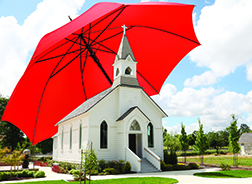By RaeAnn Slaybaugh
 Each primary area of church insurance (property, liability, automobile and workmen’s compensation) bears lesser-known considerations.
Each primary area of church insurance (property, liability, automobile and workmen’s compensation) bears lesser-known considerations.
To help church leaders navigate them, here’s some expert advice from a handful of church insurance specialists:
- Melany Stonewall, corporate communications manager at GuideOne Insurance in West Des Moines, Iowa
- Scott Figgins, vice president — underwriting at Brotherhood Mutual Insurance in Fort Wayne, Indiana
- Patrick Moreland, CPCU, vice president — marketing at Church Mutual Insurance Company in Merrill, Wisconsin
Property Figgins: In large churches, if they have a school, bookstore or other income-generating revenue, they need business income insurance. It protects against loss of that income in the event the church is damaged and the income stream is interrupted or lost.
Churches also need to look at bond coverage to protect against theft embezzlement/fraud by church volunteers or employees. This isn’t something we’d like to think would happen, but a trusted church volunteer who finds himself or herself in a difficult financial situation can justify “borrowing” church funds.
Stonewall: Pastors should investigate coverage for indirect losses, such as extra expenses, tuition fees and rents. There are also extensions that may provide additional coverage for items such as newly acquired or constructed property, property of others, off-premises property, trees, shrubs and so on.
Moreland: For insurance purposes, if a congregation would want to rebuild after a building is destroyed, they’d want to purchase a limit of insurance that approaches, or is equal to, the “replacement cost” of the building. For older buildings, this amount probably is much greater than the market value of the building.
Take an urban, cathedral-like structure, for example: It would require many millions to rebuild, but it might be nearly worthless on the selling market.
If a congregation wouldn’t want to replace a destroyed building — or would replace it with a building that’s smaller and more suitable to its current need — they might consider purchasing a limit for the “actual cash value” (ACV) of the building. There won’t be many buildings for which congregations wish to insure on this basis, because most losses aren’t total losses. An ACV limit might leave the congregation underinsured for partial losses.
Liability
Figgins: Employment liability coverage protects against wrongful termination.
It’s also important that a large church has emotional injury coverage — if, for example, a child is brought to a church by friends and is baptized, but he or she is from a Muslim family. Or, maybe a long-term member’s membership is revoked.
Moreland: Not considered “general liability” — but often packaged with it — is personal and advertising injury. The most common types of legal action in this realm are for libel, slander and defamation of character.
Less common, but very tragic, are incidents of child sexual abuse. Not all policies offered to churches include coverage for these cases, but all congregations should consider it essential.
Increasing in frequency are employment-related lawsuits alleging discrimination, wrongful termination and sexual harassments. These types of lawsuits are covered by employment practices liability insurance.
Errors and omissions made by directors and officers are covered only by directors and officers (D&O) liability insurance.
Automobile
Stonewall: Hired and non-owned business auto coverage is available on an excess basis. It covers bodily injury and property damage caused by a vehicle you hire — including rented or borrowed vehicles — or non-owned vehicles (vehicles owned by others, including vehicles owned by employees) used for business use. Generally, physical damage isn’t covered.
Figgins: If the pastor’s vehicle is being used for church use, its title probably needs to be in the church’s name.
We also offer car care coverage. If members and/or volunteers offer charity brake services, for example, a typical automobile policy won’t cover it if the brakes then fail; car care coverage will. It’s essentially “garage-keeper’s coverage” for churches.
Workmen’s compensation
Figgins: The majority of states require workmen’s compensation coverage. It covers all medical bills, lost wages and permanent injuries. In small churches, a pastor can be considered an “individual contractor,” for tax purposes; but, most states would still require him or her to be covered as an employee.
Stonewall: A workers’ compensation policy will cover full- and part-time employees. But, in most situations, volunteers aren’t covered.
Moreland: In at least one state — California — volunteers can be covered under a workers’ compensation policy. In most states, however, minor injuries to volunteers will be covered up to a low (typically several thousand dollars) limit under the medical-expenses portion of the general liability policy. Think of this as “goodwill coverage” to help avoid a lawsuit.
If a volunteer’s injury is serious and was caused by the church’s negligence, the general liability coverage and limit will be triggered.
For more in-depth insights on common church insurance gaps from these experts, don’t miss the article, Investigating Insurance: Is Your Church Really Covered?, in the June/July 2013 issue of Church Executive.



Not to take over this thread, but I want to find the best insurance agency and I can’t figure out how to find them. Does anyone have any opinions on this insurance agency? They’re based out of Louisville, only 15 minutes from my home, but I haven’t been able to find reviews on them. – Claude Reynolds Insurance Agency Inc., 6801 Dixie Highway Suite 232, Louisville, KY 40258, (502) 933-2255